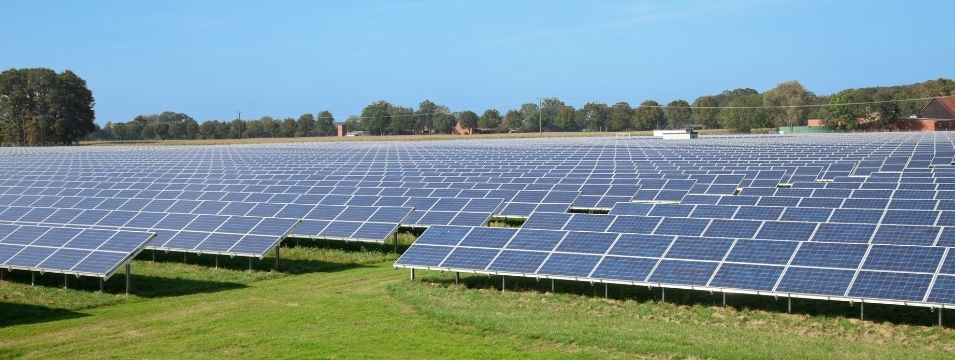Looking out on the climate and energy landscape: A review of 2021
January 6, 2022 Clean Energy, News
The 2021 United Nations Climate Change Conference (COP26), held in Glasgow, Scotland this past fall, was another “last chance” to take decisive action on climate change. Though many feel global climate change efforts thus far haven’t quite made the grade, the parties did maintain, and even improved on, commitments to achieving the goals of the 2015 Paris Agreement (to keep warming “well below” 2°C above pre-industrial temperatures, and preferably no more than +1.5°C).
Canada’s current policies are “highly insufficient” with regard to achieving these goals, according to www.climateactiontracker.org (CAT); if the whole world matched Canada’s current efforts, warming could reach over +3°C, and possibly as high as +4°C. However, if Canada manages to implement the policies needed to meet the Paris commitments, this will likely close the gap substantially. Canada’s commitment to achieve at least a 40-45% reduction in emissions by 2030 and net zero by 2050 is “almost sufficient” to achieve the higher goal of keeping temperatures to +1.5°C1.
While last year’s federal election reflected popular support for the Liberals’ climate policies, Canada’s commitment to oil sands and natural gas also remains solid, even in the face of growing tensions with Indigenous Nations and environmental groups. Repeated waves of COVID-19 cases, meanwhile, have dampened transport and commercial activity and thrown more uncertainty at investors, and some say global ambitions for “net zero” could make half the world’s fossil fuel assets worthless by 20362.
Navigating all these factors is a challenge for governments and investors, and everyone should be considering this critical question: if Canada is to achieve its goals for 2030 and net zero by 2050, where are these reductions going to come from?
Canada’s key commitments in 2021
Canada’s climate commitments became a lot more solid in 2021, through two main vehicles. The first is the Canadian Net-Zero Emissions Accountability Act, which became law in June, and provides legal backing for the 2030 and 2050 targets that represent our commitments under the United Nations Framework Convention on Climate Change.
The Net-Zero Act requires that Canada set five-year national emissions-reduction targets and develop “credible” plans to achieve them, and established a Net-Zero Advisory Body to help devise measures toward meeting the targets.3
A key tool for achieving these goals is the federal carbon pricing mandate, which applies to a wide range of solid and liquid fuels, and to heavy industry via an “output-based pricing system.” Introduced in 2019 at $20/tonne, the carbon price hit $40/tonne in 2021 and is set to rise incrementally to $170/tonne in 2030.4 The government is also working on a GHG Offset system that could expand carbon incentives to areas like agriculture and forestry.5
At COP26, Canadian Prime Minister Trudeau called on the world to join in carbon pricing: “putting a price on pollution is the most efficient and powerful way to keep 1.5 alive,” he said, referring to the higher goal of the Paris Agreement to keep global temperature increases to 1.5 degrees Celsius6. Among COP26’s achievements was an agreement on shared rules to govern international carbon markets,7 which should help bring more nations and investors to participate in carbon pricing and offsets markets.

The Federal Budget 2021 was the other major development, directing $17.6 billion to “a green recovery to create jobs, build a clean economy, and fight and protect against climate change.” It included a $5 billion top-up to the Net Zero Accelerator program, giving it a total allotment of $8 billion over seven years. The program favours reducing fossil fuel use via carbon capture, utilisation and storage (CCUS) technology, energy efficiency retrofits, and electrification of processes and equipment.
While the bulk of this funding is aimed at reducing oil and gas sector emissions – which make up over a quarter of our country’s total emissions – a portion is also allotted to innovations in the auto, agricultural and aerospace industries, and some is earmarked for improving Canada’s “batteries ecosystem.”9
Investments in clean tech were also boosted with an expanded range of tax incentives, along with plans to issue Green Bonds – to the tune of $5 billion – that will finance government funded projects. Another $2.3 billion is intended for the protection of natural areas and natural infrastructure – the largest investment in nature conservation in Canada’s history.10
Transportation generates another quarter of our emissions, and the government’s current target is to have 100% of new cars sold in Canada be zero-emission by 2035; targets for medium- and heavy-duty vehicles are still being considered as part of the Net Zero Act consultations.11

Though only about 6% of cars sold in Canada in 2020 were electric vehicles (EVs),12 the sector is well supported for growth. Building on the Zero Emissions Vehicle Infrastructure Program and existing rebates for light EVs under the Incentives for Zero-Emission Vehicles (iZEV) program, 2021 brought new supportive programs including the Zero Emissions Vehicle Awareness Initiative, the Clean Fuels Fund, and the Smart Renewables and Electrification Pathways Program (SREP).
The buildings and trades also got a big boost in the 2021 Budget with $2.6 billion over seven years being distributed under the Canada Greener Homes Grant. Homeowners can receive up to $5600 per home as a rebate for energy evaluations along with retrofits like windows, insulation, heat pumps, and solar photovoltaic (solar PV). The program is expected to result in some 2000 new home energy auditing jobs, and is already heavily subscribed: Natural Resources Canada had received over 120,000 applications by November 2021.13 These grants might also encourage the trend toward off-grid home power systems, which are increasingly popular, particularly in rural areas, as an alternative to grid connections with costly up-front charges.14
What we’re watching in 2022
The details on how Canada will achieve its 2030 targets are being worked out, and the Net Zero Act requires their publication by the end of March 2022. We’ll have a much clearer picture then of what’s in store, but key areas to watch will likely include EVs, clean fuels, and carbon pricing, as well as energy and efficiencies in buildings and industrial processes.
A major boost to business opportunities came in on January 1, 2022, with a full 50 per cent reduction of the general corporate and small business income tax rates for businesses that manufacture designated zero-emission technologies like EVs, hydrogen, and carbon capture, utilization and storage (CCUS).15
According to a recent RBC report, EVs and EV infrastructure are expected to absorb a quarter of all climate-related investment on the road to net-zero.16 Current rebate programs, like the iZEV purchase incentive, along with mandates, will likely be extended to include medium- and heavy-duty vehicles. The iZEV program is funded only until March 2022, but most provinces are now offering rebates on EVs; the four Atlantic Provinces brought in rebates last year, joining Quebec, B.C., and the northern Territories.17
We’ll see continued growth in the electrification of space and water heating with energy efficient heat pumps, which are supported by the Greener Homes program. While electricity generation equipment prices have seen inflation in the last year, installations might pick up again, especially with the proposed $4.4 billion in interest-free loans of up to $40,000 under the Greener Homes program.18
The federal carbon price rises to $50/tonne this year,19 offering a solid incentive for efficiency upgrades and fuel switching. But carbon pricing is also a long game, and is increasingly tied to global markets. Mark Carney, the UN Special Envoy on Climate Action and Finance, notes that investors really want to be looking toward the target of $170/tonne in a decade’s time.20
Another area to watch is liquid fuels – and their substitutes – as Clean Fuel Regulations targeting the carbon intensity of liquid fuels come into effect in late 2022, with deeper annual reductions through to 2030.21 These are likely to lead to growth in demand for biofuels, and also green hydrogen from biogas and renewables, which will complement Canada’s Hydrogen Strategy.22
Provincial actions & challenges
While the Federal Government rolls out the high-level policy, the provinces remain responsible for a lot of regulation, especially around electricity. The growing solar sector in Alberta has consistently remained a big news story, thanks to Alberta’s combination of a suitable climate, unique electricity market, and a carbon pricing framework that allows emitters to meet emissions reduction obligations by supporting renewable energy projects.23
In Ontario net metering continues to be popular, and the Ontario Energy Board recently indicated that third-party ownership for net metering is permissible – already the case in Alberta and Nova Scotia – which could open the way for expansion of solar leasing arrangements.24 Virtual net metering (VNM) saw new rules introduced in September 2021 that opened the VNM space, in a very limited way, for pilot projects on new developments.25 We are definitely keen to see opportunities to open VNM to a wider community.
Uptake by private sector
Higher global energy prices not only impact demand on fuels and alternatives like conservation. They can also give some energy companies room to invest in developing and deploying the technologies needed to fill the final gaps to net zero.26
Both COVID-19 and climate disruptions have put upward pressure on prices all along supply chains, including transportation, logistics, and even insurance costs. Building resilience in supply chains means additional costs, but holding an inventory of spare parts might prove a lot less costly than shutting down production when (for instance) climate change closes major rail lines and ports.
These disruptions and damages also raise concerns around liability; while some sectors could be subject to damage claims, liability is also about responsibility to customers and shareholders. In response, the Canadian Securities Administrators (CSA) aims to standardize disclosure around climate-related risks and greenhouse gas (GHG) emissions for reporting issuers with mandatory information requirements in annual filings, to be phased in starting in 2023.27 Both resilience and responsibility – or adaptation and mitigation – are important business decisions.
When it comes to emissions, at least, we are seeing plenty of activity. Growing numbers of fleets moving to embrace EVs, net zero buildings, and internal carbon pricing are increasingly common strategies. Some big players are getting creative: Air Canada, for one, is targeting net zero for 2050 – a huge challenge in the aviation industry – through the use of carbon capture and other technologies that could generate what it calls sustainable aviation fuel (SAF).28
Many firms are joining in collaborative networks to share ideas, strategies, and sometimes even compete for carbon improvements. Some of these are local to us here at Skyline Energy, like Sustainable Waterloo Region’s Regional Sustainability Initiative. Others are sector specific, like where oil patch majors have joined up to green their own image with collaborations on net zero aspirations.30 Globally, umbrella groups like the Consumer Goods Forum, the Climate Group, and the We Mean Business coalition, which hosted a Business Pavilion for Climate Leadership at COP26, continue to develop sustainability criteria to protect climate, forests, and, naturally, their members’ public image.31
Skyline Group of Companies (“Skyline”)—the parent entity of which Skyline Energy is a part— is embracing opportunities to invest in climate action and Environmental, Social and Governance (ESG), and has hired a consultant to help plan next steps. Already, Skyline knows that energy-conscious real estate upgrades can generate savings and greater comfort for the tenants that live in its apartment buildings. It has also found that awareness and outreach can invite others to contribute – for example, when it switched some of its buildings to individually metered units, its tenants’ energy use shrunk by almost half.
Investments like these are also about building relationships with people. Tenants are more comfortable in settings that align with their values and lifestyle; with in-site community garden space or EV charger stations, they are more likely to stay. This generally reduces turnover, builds community, and ultimately lowers costs. With company employees, it’s much the same story; staff are more likely to stay when a company’s ESG initiatives reflect the values of its people. Sometimes the payback is clear and quick while at other times the market may take more time to reward these efforts (which Skyline takes to mean that it is getting ahead of the curve).
At Skyline Energy we’re putting resources into refitting solar PV assets, improving the efficiency and extending the life of certain generating facilities. This avoids many of the challenges and costs of finding or developing new facilities, greatly reduces waste in the life cycle, and lends continuity to our relationships with landowners and communities.
In the future we aspire to aligning our distributed energy assets at the community scale. Creative ownership and investment structures could help build public appreciation of the essential place of energy in society. To realize this potential, we believe we need greater flexibility within provincial electricity regulations. Virtual net metering, for instance, would likely allow for more co-operative, community, and retail investment in building the essential infrastructure we need in the future. We are hopeful the government will open up to these ideas, which will be helped by communities stepping up and showing interest, and even pushing the political process in their own right.
Climate and ESG investment in demand
Calls for divestment from fossil fuel companies have grown in recent years, aided by increasing awareness around the liabilities of stranded assets, orphaned wells, fugitive methane emissions, and massive tailing ponds. Yet some funds remain heavily invested: the Canada Pension Plan, for example, actually increased its holdings of fossil fuel shares by almost 8% between 2016 and 2020.32
Steering more investment from the fossil economy to clean energy is essential. Canada’s annual climate-related investments among the transport, electricity, and buildings sectors, from both public and private sources, currently amount to around $15 billion. RBC says the investments needed to cut emissions by 75% from current levels would be $60 billion per year, or a total of $2 trillion by 2050.33

While a wide range of public and private investment vehicles have come into existence,34 the key to realizing our climate goals is the ability to generate returns that investors can be satisfied with, and there are plenty of ways policy makers can help. But maybe the investment community also needs to ask itself: what returns do we need to see in order to invest in keeping our planet habitable?
Closing thoughts
If a disastrous path to +2°C or more is to be avoided, we’re going to need all hands on deck. Canada can’t do it alone, but nor can the government take all the responsibility within Canada. The private sector has a big part to play, and some companies are making the right moves – especially where they can find cost savings and other benefits. We believe our governments have made some sound choices around incentives, but we still see a need for them to remove some barriers so we can grasp the opportunities ahead.

Rob Stein
President, Skyline Energy
Rob is responsible for the operational and financial performance of Skyline Clean Energy Fund’s clean energy asset portfolio, including overseeing acquisitions, dispositions, financial budgets, implementing and monitoring capital expenditure projects, and monitoring the assets’ functionality. With extensive experience in evaluating, building, maintaining, and selling renewable energy assets, his well-rounded knowledge of the solar energy industry is an invaluable asset to the Skyline Energy team.
Skyline Energy manages clean energy assets for Skyline Clean Energy Fund, a sustainable investment offered as a private alternative investment product by Skyline Wealth Management.
References
- Climate Action Tracker. Canada. September 15, 2021. https://climateactiontracker.org/countries/canada/. Accessed December 11, 2021.
- Watts, Jonathan, Ashley Kirk, Niamh McIntyre, Pablo Gutiérrez and Niko Kommenda. “Half world’s fossil fuel assets could become worthless by 2036 in net zero transition.” The Guardian. November 4, 2021. https://www.theguardian.com/environment/ng-interactive/2021/nov/04/fossil-fuel-assets-worthless-2036-net-zero-transition. Accessed December 15, 2021.
- Government of Canada. Canadian Net-Zero Emissions Accountability Act. June 29, 2021. https://www.canada.ca/en/services/environment/weather/climatechange/climate-plan/net-zero-emissions-2050/canadian-net-zero-emissions-accountability-act.html. Accessed December 8, 2021.
- Bakx, Kyle. “As he pushes for global carbon tax, Trudeau admits it was an uphill battle in Canada.” CBC News. November 2, 2021. https://www.cbc.ca/news/business/bakx-cop26-trudeau-carbon-tax-1.6234015. Accessed December 10, 2021.
- Government of Canada. Federal Greenhouse Gas Offset System. https://www.canada.ca/en/environment-climate-change/services/climate-change/pricing-pollution-how-it-will-work/output-based-pricing-system/federal-greenhouse-gas-offset-system.html. Accessed December 14, 2021.
- Tasker, John Paul. “Trudeau calls for global carbon tax at COP26 summit.” CBC News. November 2, 2021. https://www.cbc.ca/news/politics/trudeau-carbon-tax-global-1.6233936. Accessed December 10, 2021.
- UNFCCC. “COP26 Reaches Consensus on Key Actions to Address Climate Change.” UN Climate Press Release. November 13, 2021. https://unfccc.int/news/cop26-reaches-consensus-on-key-actions-to-address-climate-change. Accessed December 10, 2021.
- Government of Canada. Budget 2021 (Chapter 5). https://www.budget.gc.ca/2021/report-rapport/p2-en.html. Accessed December 8, 2021.
- Industry Canada. Net Zero Accelerator Initiative. https://www.ic.gc.ca/eic/site/125.nsf/eng/00039.html. Accessed December 13, 2021.
- Government of Canada. Budget 2021 (Chapter 5). https://www.budget.gc.ca/2021/report-rapport/p2-en.html. Accessed December 8, 2021.
- Yakub, Mehanaz. “Canada’s emissions plan for 2030 targets to be released in spring 2022 as strategic consultations begin.” Electric Autonomy Canada. December 8, 2021. https://electricautonomy.ca/2021/12/08/canada-emissions-plan-consultations/. Accessed December 11, 2021.
- Climate Action Tracker. Canada (Policies and Actions – Transport). September 15, 2021. https://climateactiontracker.org/countries/canada/. Accessed December 11, 2021.
- Sharkey, Jackie. “Why you may need to be patient to take advantage of the new Canada Greener Homes Grant”. CBC News. May 28, 2021. https://www.cbc.ca/news/canada/kitchener-waterloo/canada-greener-homes-grants-reep-ameri-spec-canada-1.6043180. Accessed December 30, 2021; Cummings, Madeleine. “Demand for energy auditors still high in Alberta months after federal grant launch”. CBC News. November 10, 2021. https://www.cbc.ca/news/canada/edmonton/demand-for-energy-auditors-still-high-alberta-federal-grant-1.6242770. Accessed January 6, 2022.
- Lancaster, John. “Facing sky-high connection fees, rural Ontarians go off the grid.” CBC News. October 26, 2021. https://www.cbc.ca/news/canada/toronto/wind-solar-power-rural-ontario-1.6224159. Accessed December 10, 2021.
- Government of Canada. Budget 2021 (Chapter 5). https://www.budget.gc.ca/2021/report-rapport/p2-en.html. Accessed December 8, 2021.
- RBC, 2021. The $2 Trillion Transition: Canada’s Road to Net Zero. October 20, 2021. https://thoughtleadership.rbc.com/the-2-trillion-transition/. Accessed December 11, 2021.
- Rabson, Mia. “Canada looks to retool EV rebate program to include more expensive SUVs, pickups.” The Toronto Star. December 11, 2021. https://www.thestar.com/news/canada/2021/12/11/canada-looks-to-retool-ev-rebate-program-to-include-more-expensive-suvs-pickups.html. Accessed December 11, 2021.
- CMHC. “Canada Greener Homes.” September 10, 2021. https://www.cmhc-schl.gc.ca/en/professionals/project-funding-and-mortgage-financing/funding-programs/all-funding-programs/canada-greener-homes. Accessed December 11, 2021.
- Energy Hub. Canadian Carbon Prices & Rebates (Updated 2021). https://www.energyhub.org/carbon-pricing/. Accessed December 13, 2021.
- Bakx, Kyle. “As he pushes for global carbon tax, Trudeau admits it was an uphill battle in Canada.” CBC News. November 2, 2021. https://www.cbc.ca/news/business/bakx-cop26-trudeau-carbon-tax-1.6234015. Accessed December 10, 2021.
- Sadvari, Alex. “Adding (less intense) fuel to the fire: Proposed Canadian Clean Fuel Regulations will reduce the carbon intensity of liquid fuels.” Gowling WLG. January 13, 2021. https://gowlingwlg.com/en/insights-resources/articles/2021/canadian-clean-fuel-regulations/. Accessed December 11, 2021.
- Lalach, Jay. “Hydrogen Strategy for Canada.” Gowling WLG. December 22, 2020. https://gowlingwlg.com/en/insights-resources/articles/2020/hydrogen-strategy-for-canada/. Accessed December 13, 2021.
- Lamb, Adrien, and Rick Bremness. “Could this be solar power’s time to shine in Alberta?” CBC News. November 6, 2021. https://www.cbc.ca/news/canada/edmonton/solar-nait-solar-alberta-heather-mackenzie-jim-sandercock-robert-hornung-1.6235858. Accessed December 5, 2021.
- PVBuzz. “Third-party ownership and financing of net-metering solar is allowed in Ontario”. PVBuzz News Insight. November 1, 2021. https://pvbuzz.com/third-party-financing-of-net-metering-solar-ontario/. Accessed December 5, 2021.
- Sadikman, Jacob, Richard King, Evan Barz, and Cole Travener. “Ontario’s new community net metering regulation for pilot projects.” Osler Clean Energy Transition Blog. October 7, 2021. https://www.osler.com/en/blogs/energy/october-2021/ontario-s-new-community-net-metering-regulation-for-pilot-projects. Accessed December 15, 2021.
- Santos, Allen. “Energy Crisis Gives Canada Oil Sands Windfall for Green Projects.” Energy Newsbeat. November 18, 2021. https://energynewsbeat.co/2021/11/energy-crisis-gives-canada-oil-sands-windfall-for-green-projects/. Accessed December 11, 2021.
- Ontario Securities Commission. 51-107 – Consultation Climate-related Disclosure Update and CSA Notice and Request for Comment Proposed National Instrument 51-107 Disclosure of Climate-related Matters. October 18, 2021. https://www.osc.ca/en/securities-law/instruments-rules-policies/5/51-107/51-107-consultation-climate-related-disclosure-update-and-csa-notice-and-request-comment-proposed. Accessed December 5, 2021.
- Burgess, Molly. “Air Canada looks to achieve net-zero targets with Carbon Engineering technology.” Gas World. 10 November, 2021. https://www.gasworld.com/air-canada-looks-to-achieve-net-zero-targets-with-carbon-engineering-technology/2022154.article. Accessed December 8, 2021.
- Sustainable Waterloo Region. Regional Sustainability Initiative. https://www.sustainablewaterlooregion.ca/join-a-program/regional-sustainability-initiative/. Accessed December 15, 2021.
- CBC. “Canada’s oilsands producers form alliance to achieve net-zero emissions by 2050.” CBC News. June 9, 2021. https://www.cbc.ca/news/canada/calgary/oilsands-canada-net-zero-alliance-1.6058809. Accessed December 10, 2021.
- Consumer Goods Forum. Homepage. https://www.theconsumergoodsforum.com/. Accessed December 11, 2021; The Climate Group EV100.https://www.theclimategroup.org/about-ev100. Accessed December 15, 2021; We Mean Business Coalition. Catalyzing Climate Leadership at COP26. https://www.wemeanbusinesscoalition.org/cop26/. Accessed December 15, 2021.
- Dempsey, Jessica, James Rowe, Katie Reeder, Jack Vincent, and Zoë Yunker. An Insecure Future: Canada’s biggest public pensions are still banking on fossil fuels. Corporate Mapping Project (CMP) and Canadian Centre for Policy Alternatives. August 2021, p. 7. https://www.policyalternatives.ca/publications/reports/insecure-future. Accessed December 13, 2021. On divestment generally, see https://oilsandsdivest.com/.
- RBC, 2021. The $2 Trillion Transition: Canada’s Road to Net Zero. October 20, 2021. https://thoughtleadership.rbc.com/the-2-trillion-transition/. Accessed December 11, 2021.
- The Climate Policy Initiative provides a comprehensive biennial review; see Buchner, Barbara, et al. Global Landscape of Climate Finance 2021. Climate Policy Initiative. https://www.climatepolicyinitiative.org/publication/global-landscape-of-climate-finance-2021/. Accessed December 1, 2021.
About Skyline Clean Energy Fund
Skyline Clean Energy Fund (“SCEF”) is a privately owned and managed portfolio of medium to large scale clean energy assets, focused on acquiring income-producing assets across Canada, under long-term government contracts.
SCEF is offered as an alternative investment product through Skyline Wealth Management Inc. (“Skyline Wealth Management”), the exclusive Exempt Market Dealer (EMD) for SCEF.
SCEF is committed to surfacing value to its investors through asset monitoring and optimization, while providing a sustainable investment product based in clean, renewable energy.
To learn more about SCEF and its asset manager, Skyline Energy, please visit SkylineEnergy.ca.
To learn about additional alternative investment products offered through Skyline Wealth Management, please visit SkylineWealth.ca.
Skyline Clean Energy Fund is operated and managed by Skyline Group of Companies.
For media inquiries, please contact:
Bethany Curtis
Manager, Content Marketing and Communications, Skyline Group of Companies
5 Douglas Street, Suite 301
Guelph, ON N1H 2S8
519.826.0439 x231
More from this category:

Skyline Energy President Recognized as 2024 Clean50 Honouree
[Guelph, Ontario – September 29, 2023] Rob Stein, President, Skyline Energy, has been recognized as one of Canada’s 2024 Clean50 Honourees. Stein leads the operations and financial performance of both Skyline Energy, a clean energy asset manager, and Skyline Clean Energy Fund, an equity growth fund comprised of solar and biogas assets totalling 50.16 MW/DC1 in [...]
Skyline featured in Canadian Apartment Magazine for decarbonization efforts
[Guelph, Ontario – April 21, 2023] Read the original article published in Canadian Apartment Magazine. R. Jason Ashdown, Co-founder & Chief Sustainability Officer, and Rob Stein, President, Skyline Energy, were featured in an article published by Canadian Apartment Magazine on how rental housing providers can implement sustainability practices to lower their carbon footprint. The article [...]




